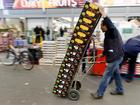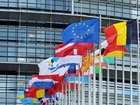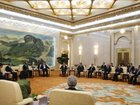Dressed in Chelsea football shorts and a wide-brimmed hat, Than Tun toils away in his paddy field on the outskirts of Yangon, sweat pouring down his sinewy arms.
Grueling work that once helped Myanmar become the world's largest rice exporter is today a Herculean and often lonely job for farmers striving to return the impoverished nation to its former grain prowess.
 Full Story
Full Story
U.S. technology giant Microsoft has launched a pilot program to hire autistic workers at its headquarters in Washington state.
"People with autism bring strengths that we need at Microsoft," Mary Ellen Smith, a corporate vice president wrote in a company blog last week.
 Full Story
Full Story
Advanced economies face limits on future growth due to the drag from aging populations, unless they can boost productivity through technology and infrastructure investment, the International Monetary Fund said Tuesday.
A higher proportion of aged citizens means a smaller workforce and lower potential output, which in turn could spell lower living standards in the future, the IMF said in a new study.
 Full Story
Full Story
Singapore Telecom (Singtel) said Wednesday it will buy almost all of U.S. cybersecurity firm Trustwave for $810 million, saying it was looking to become "a global player" in the sector.
Southeast Asia's biggest telecom firm by revenue said it will acquire a 98 percent equity interest in Trustwave under an agreement it signed with the Chicago-headquartered company.
 Full Story
Full Story
The EU is seeking information from Spain, Italy, Greece and Portugal to determine if they have illegally supported their frail banks, officials said Tuesday.
The issue is potentially serious since if the four cash-strapped eurozone countries are found at fault they would have to repay the state aid and find other funds to prop up the banks.
 Full Story
Full Story
Iran has been approved as a founding member of the Beijing-backed Asian Infrastructure Bank (AIIB), China's finance ministry said Tuesday, just days after Tehran sealed a historic framework agreement on its nuclear program.
Tehran's application was backed by other founding members on Friday, China's Ministry of Finance said in a statement on its website. The United Arab Emirates' bid was also approved.
 Full Story
Full Story
Germany owes Greece more than 278 billion euros ($306 billion) in war payments, including some 10 billion for a forced loan taken by Nazi occupation forces, a junior minister has told parliament.
"According to our calculations, the debt linked to German reparations is 278.7 billion euros, including 10.3 billion for the so-called 'forced loan'," junior finance minister Dimitris Mardas told the chamber on Monday.
 Full Story
Full Story
U.S. delivery service FedEx has reached a deal to buy Dutch rival TNT Express for 4.4 billion euros (4.8 billion dollars), ramping up its presence in Europe as global e-commerce continues to expand.
The companies "reached conditional agreement on a recommended all-cash public offer of 8.00 (euros) per ordinary TNT Express share," a joint statement said.
 Full Story
Full Story
Boeing is fighting tough efforts by rival Airbus to score big gains in the market for long-haul jets, a segment of the massive aircraft market that the U.S. giant has dominated.
Neck-and-neck with Boeing in sales of single-aisle, 150-200 passenger jets, Airbus has badly lagged its U.S. archrival in wide-body aircraft with 250-450 seats.
 Full Story
Full Story
Tokyo shares ended lower Monday while the yen climbed against the dollar following a worse than expected U.S. jobs report seen as making an early U.S. rate rise more unlikely.
Oil prices rose on expectations that any new exports from Iran would not likely come on the market for some time, despite the initial nuclear agreement.
 Full Story
Full Story



